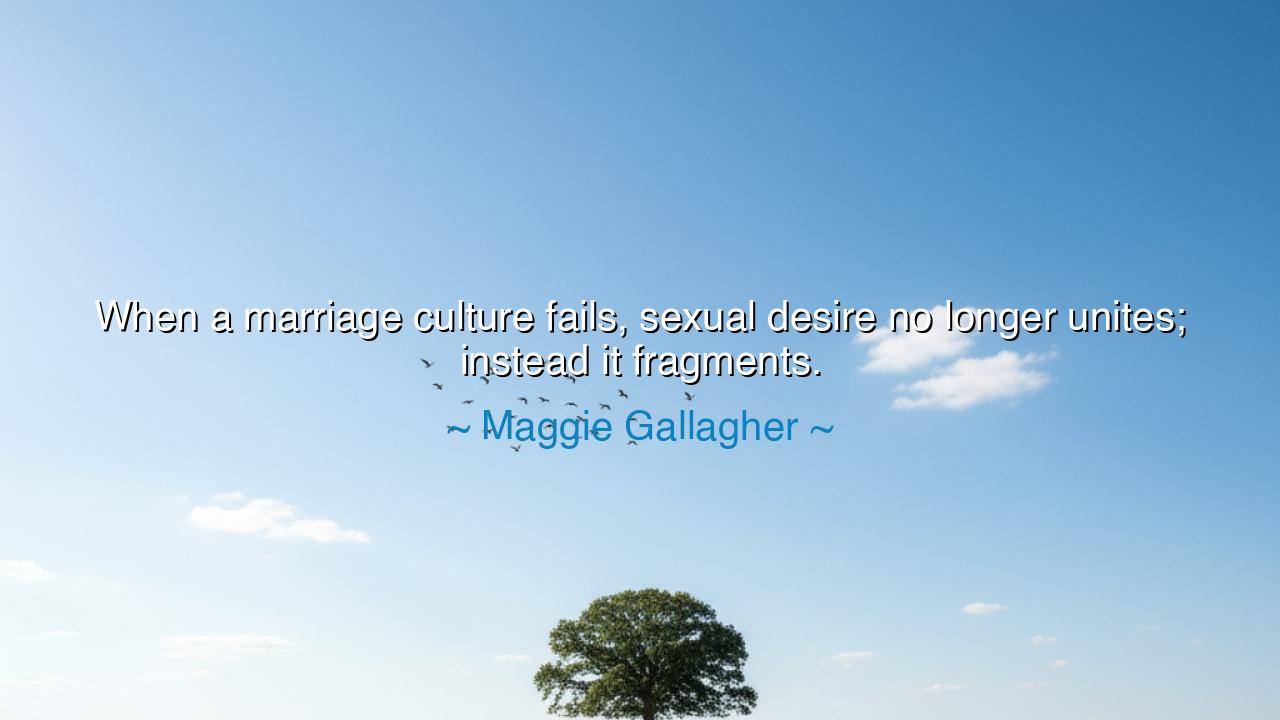
When a marriage culture fails, sexual desire no longer unites;






In the beginning, marriage was conceived as a sacred bond, a union that transcended the desires of the flesh and grounded itself in the timeless principles of commitment, trust, and shared purpose. It was a bond that anchored societies, held families together, and formed the very foundation upon which civilizations were built. Yet, as Maggie Gallagher so poignantly states, "When a marriage culture fails, sexual desire no longer unites; instead, it fragments." In these words, we hear the ancient lament of a world that has forgotten the purpose of marriage—the unity of two souls, once bound by more than passion, now fractured by the shifting sands of modernity.
When a culture places its faith solely in the physical and transient, the deep emotional connection that once made marriage a pillar of society begins to wilt. Sexual desire, once a powerful force that drew two people together in harmony, becomes reduced to mere impulse—a fleeting and fragmented pursuit that no longer serves the whole but fragments the soul. The culture of marriage—the ancient understanding that union is about more than mere desire—begins to erode, leaving only the hollow remnants of what was once a sacred covenant. Without a foundation in shared purpose, passion can only drift like a leaf on the wind, unable to find its true course.
Consider, if you will, the tragic fate of Rome, once a mighty empire founded on strong familial ties and social unity. The Roman state was, in its height, a reflection of a culture that deeply revered the institution of marriage. The Roman family, and the marriage at its core, was an anchor in the tumultuous seas of history. Yet, as Rome’s values began to shift, as its focus turned increasingly toward pleasure, luxury, and the indulgence of the senses, the very fabric of Roman marriage began to fray. When marriages lost their sacredness and were reduced to mere contracts of convenience or pleasure, the great empire weakened. The unity that had once made Rome strong was undone by a fragmentation of purpose, and the empire crumbled beneath the weight of its own decay.
The lesson of history is a powerful one: the strength of marriage is not derived from the physical connection alone, but from a deep, soulful union that transcends the physical and touches the eternal. Without this deeper connection, desire becomes a force that divides rather than unites. The very intimacy that should bind souls together becomes something shallow, something that leaves the spirit wanting, fragmented, and empty. It is this truth that we must heed in our own time, as we witness the rising tide of fractured relationships, where sexual desire often reigns supreme, but marriage itself has lost its sacred place.
Let us look to the wise example of Mahatma Gandhi, who, in his life and teachings, emphasized the importance of spiritual unity and self-control. Gandhi believed that true love and union were not born from mere physical attraction or desire, but from a deeper, spiritual connection—one that transcends the fleeting moments of physical pleasure. In his own marriage to Kasturba, Gandhi spoke of the need for a bond that was built on shared values, mutual respect, and a common purpose that went beyond the temporary. Gandhi’s marriage was not without its trials, but it stood firm because it was rooted in a greater vision, a vision of unity, equality, and respect.
As we look to the future, we must ask ourselves: What is the true purpose of marriage in our lives? Is it merely a contract to satisfy physical desire, or is it a sacred bond that unites two souls in the pursuit of something greater? When we fail to recognize the deeper purpose of marriage, we risk fragmentation—the breaking of the union that once held us together. We must seek to restore the sanctity of marriage, to recognize that the true union of two people goes beyond the physical and touches the spiritual, the emotional, and the intellectual. Sexual desire should not be the glue that holds a marriage together, but the overflow of a deeper connection—a connection built on trust, commitment, and shared purpose.
In your own life, dear listener, remember this: When you enter into a union, be it marriage or any relationship, seek not only the fleeting passions of the flesh, but the eternal bonds of the soul. Nurture a connection that transcends the surface, one that is rooted in respect, understanding, and a shared vision. Let not your desires lead you into fragmentation, but let them be the reflection of a deeper unity that holds you together, even in the most difficult of times. Only in this way can you find the true strength that comes from a partnership grounded in purpose. And know this: the more you seek this deeper union, the more your love will transcend the fleeting and become eternal.






AAdministratorAdministrator
Welcome, honored guests. Please leave a comment, we will respond soon